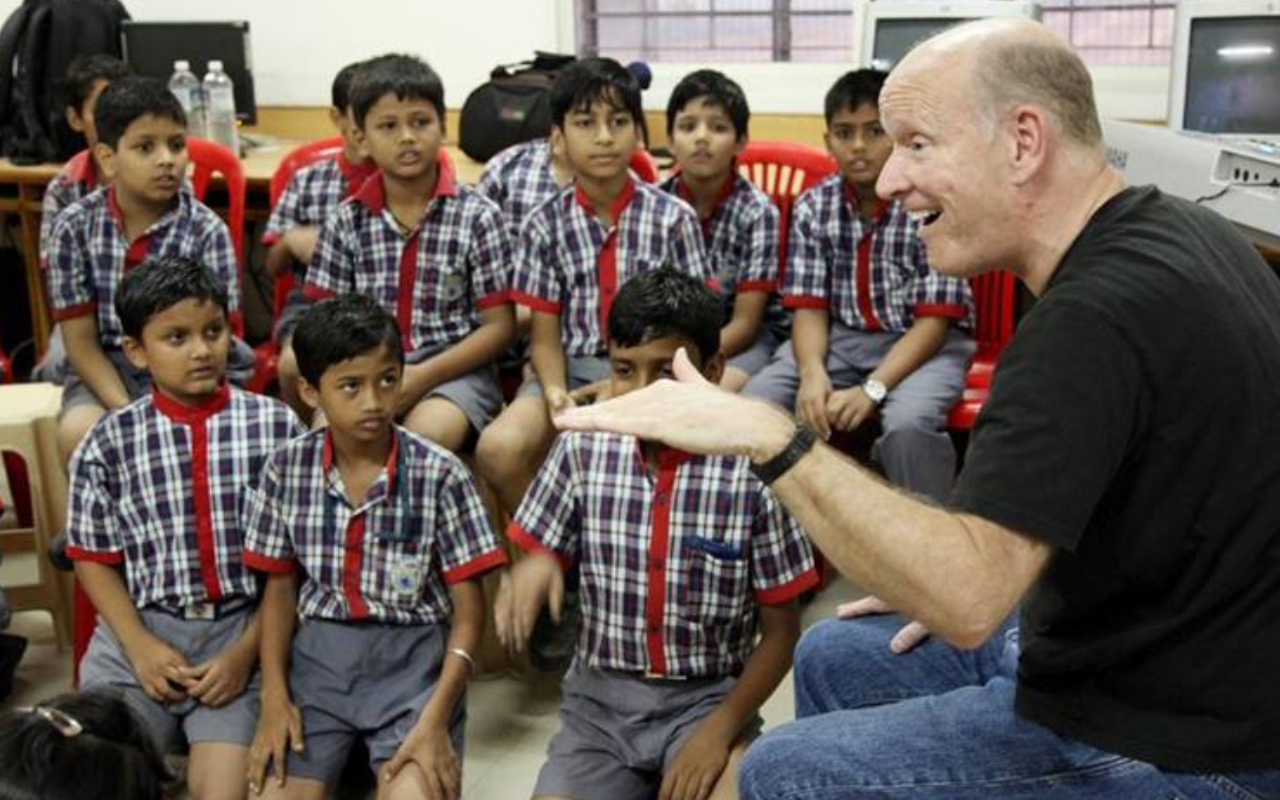
Richard Frostick delivers singing workshops for children in India.
Photo: Sing Up Foundation
World voices sing up
There’s widespread acknowledgement of the positive impact of singing on health and wellbeing. Celi Barberia outlines how a groundbreaking project is sharing these benefits with children from across the world.
For many in this field, the connection between singing and wellbeing has always been clear. But this realisation is now becoming part of the collective consciousness with extensive research supporting the myriad benefits of singing.
Sing Up began in 2007 with the National Singing Programme. Its main focus was on singing in schools in England as a method of supporting learning and wider musical education.
Very quickly, teachers began reporting the incredible transformations they were witnessing in their pupils' confidence and self-esteem, their behaviour and overall happiness. This was a pivotal moment for Sing Up and reinforced our passion to advocate for the power of singing.
World voices
In 2013, inspired by Sing Up, the British Council set up the World Voice programme to train teachers overseas to use singing to develop musicality and as a tool for learning in the classroom. It was developed by Richard Frostick and Bridget Whyte and, over a period of seven years, it enriched the lives of 1.55 million children across 23 countries*.
World Voice also developed the skills of over 12,000 teachers. Built on a cascade model, the international training programme sent experienced singing leaders to work with children, then to train the children’s teachers, music specialists and lay teachers. Finally, they trained some of these teachers to become Master Trainers to mentor and cascade the methods further.
World Voice worked in a wide variety of contexts and was adapted to support a range of outcomes for children, from supporting language learning, to fostering a sense of community in refugee camps, to using the content of songs to learn about curriculum subjects and more.
Across all contexts across the world, World Voice had a tangible impact on the wellbeing of the children and their teachers, highlighting and supporting the established research about the wide-ranging benefits of singing on health and wellbeing.
Key outcomes
In the programme evaluation by Sound Connections, the benefits of the singing programme on overall wellbeing, on the children’s sense of achievement, social skills, behaviour, engagement and building relationships were all highlighted as key outcomes.
100% of teachers thought the children’s wellbeing had increased through the programme and “a common theme across all countries was that through World Voice, classrooms became more joyful and creative places and children found learning more fun and uplifting”.
According to Cathy Graham, Director of Music at the British Council: “The joy that World Voice has generated for everyone who has been associated with it across the world is truly inspirational, and a ringing endorsement of the power of singing to improve lives.
“Sing Up, who delivered the National Singing Programme in England during 2007 – 2012, was the original inspiration for World Voice […] The British Council is delighted that the initiative’s important cultural relations legacy will continue to flourish under Sing Up.”
The legacy
Over the years, Sing Up has extended the use of singing as an agent of change from schools to wider communities. And in 2018, as part of its continuing dedication to promoting the benefits of singing for children and young people, it set up a charitable arm – the Sing Up Foundation.
Its explicit remit is to produce, promote and create opportunities for children and young people to improve their mental health and wellbeing through singing – something which is very much in demand with the growing crisis in young people’s mental health.
The Sing Up Foundation will continue the legacy of the British Council’s World Voice programme, developing and building upon what has been achieved. Our website makes available training materials and World Voice resources, including the World Voice Teacher’s Handbook, videos, the Sound Connections evaluation and a selection of song materials.
We’re exploring how to use the learnings of World Voice to build new projects both at home and overseas. Given our international focus and history of working with refugees, we’re developing a UK singing project aimed at young unaccompanied minors and refugees to help not only with mental health but also with language learning, social inclusion and integration into their new communities.
With so many young people in need and a growing mental health crisis, we’re convinced that singing has an important role to play.
Celi Barberia is Head of the Sing Up Foundation.
![]() www.singupfoundation.org
www.singupfoundation.org
![]() @SingUpFndation
@SingUpFndation
*Argentina, Bangladesh, Brazil, Chile, Colombia, Cyprus, Ethiopia, Greece, Hong Kong, India, Jordan, Kenya, Lebanon, Morocco, Nepal, Palestine, Russia, Rwanda, Senegal, Sierra Leone, Sudan, United Kingdom and Zimbabwe
Join the Discussion
You must be logged in to post a comment.